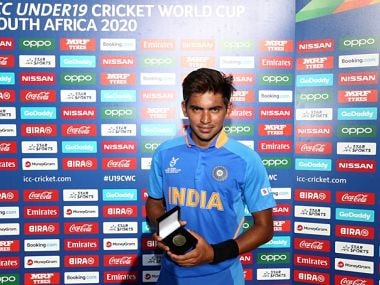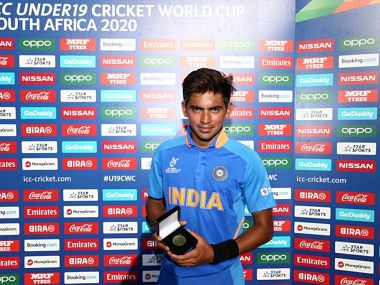India are through to a
third consecutive final
at the ICC Under-19 World Cup — the first team to achieve the distinction in 13 editions of the competition. And they’ve got there with a crushing semi-final victory over Pakistan for the second time running. Billed as a battle of pace, the first of the Super League semi-finals in South Africa ended up being a total no-contest. [caption id=“attachment_7997751” align=“alignleft” width=“380”] Kartik Tyagi continued his fine form as a combined bowling effort laid the foundation for India’s win.[/caption] The arch-rivals had both got to this stage of the tournament with fairly similar campaigns — Pakistan, like India, should have finished top of their group had rain not intervened their final game against Bangladesh — and fiery fast bowlers had been a common constant for both. Coming into the semis, Pakistan’s young pacers outweighed their Indian counterparts with 28 wickets to 19. But not a great deal separated the two pace batteries on the overall count: Pakistan averaged 14, India 14.63; Pakistan’s quicks gave up 4.42 runs per over, India’s 3.88; Pakistan were knocking a wicket down every 18.9 deliveries, India 22.6. At Potchefstroom on Tuesday, the pace-bowling figures read thus: Pakistan 18-2-87-0, India 23.1-0-85-5. Game, set and match to the Indian arsenal. Kartik Tyagi took 2/32 from eight overs, Sushant Mishra was the pick of the entire Indian attack with 3/28 from 8.1 and Akash Singh, despite not taking a wicket, kept the lid on the run-scoring by giving away only 25 runs from his seven overs. Any slim hopes that Pakistan harboured at the innings break rested with the traditional tussle in India-Pakistan cricket contests, senior or junior — Pakistan’s pacers versus India’s batsmen. Those minuscule chances, too, were laid to rest, and spectacularly so, by the yin and yang that was Yashasvi Jaiswal and Divyaansh Saxena. Their combined efforts meant India could easily see off any threats posed by Pakistan’s biggest weapons; Tahir Hussain had seven wickets from the first four games, and Mohammad Amir Khan had tallied the same amount in just two appearances. But chasing 173, India had no qualms in seeing of the duo. Tahir’s six overs were respectfully seen out for 17 runs, Amir’s five overs for 20. And Pakistan’s leading wicket-taker — Abbas Afridi, with nine strikes before the semis — was smacked for 50 in seven overs. The Indian openers drove their team to the first-ever 10-wicket win in a knockout clash at the U-19 World Cup, Jaiswal bludgeoning his way to an unbeaten 105 off 113 balls and Saxena equally responsible for blunting the Pakistan attack with a steely 59 not out from 99 balls. Jaiswal’s century took what has been a solid individual campaign to greater heights. The 18-year-old from Mumbai has crossed 50 in four out of five innings in South Africa — the only time he didn’t, Jaiswal was 29 not out in a chase of 42. It gives him an overall tally of 312 runs from five innings, out only twice, at a healthy strike rate of 85.71; that’s 107 clear of any batsman still surviving in the competition. Jaiswal and Saxena’s tandem act also furthered the gulf between the sides on the day. What initially became India’s first century stand for the opening wicket in an U-19 World Cup game against Pakistan ended up being the third-highest partnership in any knockout game in the competition’s history (and only four behind the highest). Strangely enough, three of the four 175+ stands in U-19 World Cup knockout ties now belong to Indian pairs batting against Pakistan. The drubbing, and its margin, mind you, is quite rare in the tournament. There have been only two instances in past of a 10-wicket win in an Under-19 World Cup game between two Full-Member teams — and both had come against Zimbabwe (in the 2018 edition). The last World Cup meeting between these teams, the semi-final of the 2018 edition, had produced the biggest knockout win for a side batting first, as India won by 203 runs. This time around, it produced the biggest knockout win for a chasing side. India beating Pakistan in a World Cup game — Virender Sehwag had a typically, caustically, humourous take on social media — but it is, statistically, quite a commonality. The senior team’s streak is, of course, the stuff of legends; the juniors, too, have four wins on the trot now, with the last defeat dating back to 2010. The women maintain the symmetry, having won all three of their ODI World Cup bouts against Pakistan. But India and Pakistan embroiling themselves in a battle of pace, and India reducing it to a no-contest with a demolition job — that’s new. We could get used to it, couldn’t we?
Kartik Tyagi continued his fine form as a combined bowling effort laid the foundation for India’s win.[/caption] The arch-rivals had both got to this stage of the tournament with fairly similar campaigns — Pakistan, like India, should have finished top of their group had rain not intervened their final game against Bangladesh — and fiery fast bowlers had been a common constant for both. Coming into the semis, Pakistan’s young pacers outweighed their Indian counterparts with 28 wickets to 19. But not a great deal separated the two pace batteries on the overall count: Pakistan averaged 14, India 14.63; Pakistan’s quicks gave up 4.42 runs per over, India’s 3.88; Pakistan were knocking a wicket down every 18.9 deliveries, India 22.6. At Potchefstroom on Tuesday, the pace-bowling figures read thus: Pakistan 18-2-87-0, India 23.1-0-85-5. Game, set and match to the Indian arsenal. Kartik Tyagi took 2/32 from eight overs, Sushant Mishra was the pick of the entire Indian attack with 3/28 from 8.1 and Akash Singh, despite not taking a wicket, kept the lid on the run-scoring by giving away only 25 runs from his seven overs. Any slim hopes that Pakistan harboured at the innings break rested with the traditional tussle in India-Pakistan cricket contests, senior or junior — Pakistan’s pacers versus India’s batsmen. Those minuscule chances, too, were laid to rest, and spectacularly so, by the yin and yang that was Yashasvi Jaiswal and Divyaansh Saxena. Their combined efforts meant India could easily see off any threats posed by Pakistan’s biggest weapons; Tahir Hussain had seven wickets from the first four games, and Mohammad Amir Khan had tallied the same amount in just two appearances. But chasing 173, India had no qualms in seeing of the duo. Tahir’s six overs were respectfully seen out for 17 runs, Amir’s five overs for 20. And Pakistan’s leading wicket-taker — Abbas Afridi, with nine strikes before the semis — was smacked for 50 in seven overs. The Indian openers drove their team to the first-ever 10-wicket win in a knockout clash at the U-19 World Cup, Jaiswal bludgeoning his way to an unbeaten 105 off 113 balls and Saxena equally responsible for blunting the Pakistan attack with a steely 59 not out from 99 balls. Jaiswal’s century took what has been a solid individual campaign to greater heights. The 18-year-old from Mumbai has crossed 50 in four out of five innings in South Africa — the only time he didn’t, Jaiswal was 29 not out in a chase of 42. It gives him an overall tally of 312 runs from five innings, out only twice, at a healthy strike rate of 85.71; that’s 107 clear of any batsman still surviving in the competition. Jaiswal and Saxena’s tandem act also furthered the gulf between the sides on the day. What initially became India’s first century stand for the opening wicket in an U-19 World Cup game against Pakistan ended up being the third-highest partnership in any knockout game in the competition’s history (and only four behind the highest). Strangely enough, three of the four 175+ stands in U-19 World Cup knockout ties now belong to Indian pairs batting against Pakistan. The drubbing, and its margin, mind you, is quite rare in the tournament. There have been only two instances in past of a 10-wicket win in an Under-19 World Cup game between two Full-Member teams — and both had come against Zimbabwe (in the 2018 edition). The last World Cup meeting between these teams, the semi-final of the 2018 edition, had produced the biggest knockout win for a side batting first, as India won by 203 runs. This time around, it produced the biggest knockout win for a chasing side. India beating Pakistan in a World Cup game — Virender Sehwag had a typically, caustically, humourous take on social media — but it is, statistically, quite a commonality. The senior team’s streak is, of course, the stuff of legends; the juniors, too, have four wins on the trot now, with the last defeat dating back to 2010. The women maintain the symmetry, having won all three of their ODI World Cup bouts against Pakistan. But India and Pakistan embroiling themselves in a battle of pace, and India reducing it to a no-contest with a demolition job — that’s new. We could get used to it, couldn’t we?
ICC U-19 World Cup 2020: India win 'battle of pace' against Pakistan as fast men announce their arrival
Yash Jha
• February 5, 2020, 11:52:55 IST
Coming into the semis, Pakistan’s young pacers outweighed their Indian counterparts with 28 wickets to 19. But not a great deal separated the two pace batteries on the overall count.
Advertisement
)
End of Article